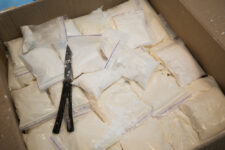Drug Importation in Australia

The Australian Federal Police (AFP), Australian Border Force (ABF) and New South Wales Police Force (NSWPF) issued a joint media release this morning to report the seizure of ‘hundreds of kilograms of border controlled drugs’ from a vessel off the Newcastle coast.
According to law enforcement agencies, an investigation was commenced on 11 August 2020 after a ‘suspicious foreign vessel’ was observed outside Australian waters.
The ABF’s Maritime Border Command tracked the movements of the vessel as it headed towards Australian waters, allegedly observing an Australian commercial fishing vessel approaching it and making an ‘at-sea transfer of illicit drugs bound for Australia’.
The NSWPF Marine Area Command reportedly intercepted the Australian vessel off the Newcastle coast on 15 August 2020, seizing a ‘large amount of border controlled drugs’ that were located in its cargo.
According to police, presumptive testing of the substance was conducted which indicated the presence of cocaine.
Three crew members were arrested during the search and seizure – two Australian males aged 27 and 32, and a Hong Kong male aged 40.
The men were subjected to COVID screening by New South Wales Health before being decontaminated by New South Wales Fire and Rescue’s Hazardous Material Response Unit.
The trio were later charged with importing a commercial quantity of prohibited drug, refused police bail and later refused bail in Central Local Court.
Investigators from the AFP, NSWPF and ABF are reported to have executed search warrants on homes in Chatswood, Zetland and Glenbrook on 17 August 2020, in an attempt to locate others allegedly associated with the operation.
Investigations are continuing.
The offence of drug importation in Australia
Drug importation is an offence under sections 307.1 (commercial quantity), 307.2 (marketable quantity) and 307.3 (any quantity) of the Criminal Code Act 1995.
To be found guilty of the offence, the prosecution must prove beyond a reasonable doubt that:
- You imported a border controlled substance, and
- You knew the substance was a border controlled substance, or were reckless as to whether or not it was a border controlled substance.
The term ‘import’ includes to bring the substance into Australia, as well as to deal with the substance in connection with its importation.
The term ‘reckless’ means you foresaw there was a substantial risk the substance was a border controlled plant but went ahead with your actions regardless.
If the prosecution wishes to charge you with importing a marketable or commercial quantity of drugs, it will need to prove the existence of that quantity.
The relevant quantity for the purpose of drug importation offences is the pure quantity of the drugs.
So, for example, if the charges related to 1 kilogram of cocaine at a purity of 45%, the relevant weight for the purpose of the charge is 450 grams.
This is different to state offences such as drug supply, where the entire weight of the substance – known as the ‘admixture’ – is relevant.
| Offence | Quantity |
| Importing a commercial quantity of drugs (Section 307.1) |
|
| Importing a marketable quantity of drugs (Section 307.2) |
|
| Importing any quantity of drugs (Section 307.3) | The prosecution does not need to prove a particular quantity; it will be enough to import any quantity of drugs. |
The maximum penalties that apply to drug importation charges, as well as the penalties actually imposed, are reflected in the following table:
| Offence | Quantity | Maximum Penalty | Median penalty |
| Importing a commercial quantity of drugs (Section 307.1) |
|
Life imprisonment | Imprisonment (92%), with full term of 8 years and non-parole period of 6 years. |
| Importing a marketable quantity of drugs (Section 307.2) |
|
25 years imprisonment | Imprisonment (99%), with full term of 6 years and non-parole period of 4 years. |
| Importing any quantity of drugs (Section 307.3) | The prosecution does not need to prove a particular quantity; it will be enough to import any quantity of drugs. | 10 years imprisonment | Imprisonment (62%), with full term of 18 months and non-parole period of 12 months. |
Charged with drug importation?
If you or a loved-one is charged with drug importation, call Sydney Criminal Lawyers® today on (02) 9261 8881 for advice and representation from a specialist criminal defence team that is vastly experienced in defending serious drug cases.
Have a look through our recent criminal law cases for examples of commercial drug importation cases we have won, as well as the difficult circumstances in which we have achieved bail for clients in high-profile, large commercial drug cases.
Receive all of our articles weekly
Related Articles
RELATED LEGISLATION
- Section 307.1 Criminal Code Act 1995 | Importing or Exporting A Commercial Quantity of Border Controlled Drugs
- Section 307.2 Criminal Code Act 1995 | Importing or Exporting a Marketable Quantity of Border Controlled Drugs
- Section 307.3 Criminal Code Act 1995 | Importing or Exporting Border Controlled Drugs






